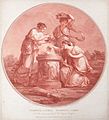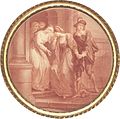Gavriil Skorodumov
Gavriil Skorodumov | |
|---|---|
| Гавриил Иванович Скородумов | |
 Self-Portrait in the Print Room of the Hermitage, c. or after 1785, watercolor, Russian Museum, Saint Petersburg | |
| Born | March 12, 1755 |
| Died | July 12, 1792 (aged 37) |
| Resting place | Smolensky Cemetery, Saint Petersburg |
| Nationality | Russian |
| Education | |
| Alma mater | Imperial Academy of Arts (1773) |
| Known for | |
| Awards | |
| Elected | Member Academy of Arts (1785) |
Gavriil Ivanovich Skorodumov (Russian: Гавриил Иванович Скородумов; 12 March 1755 – 12 July 1792)[2] was a Russian Empire engraver, draftsman, and painter, best known for his stipple prints. The most notable printmaker from the Catherinian era, Skorodumov had an active career that spanned three decades, and was regarded as the first Russian-born artist to gain international acclaim.[3]
Biography
[edit]He was born into a family of hereditary craftsmen. In 1764, he was admitted to the Imperial Academy of Arts, where he studied painting and engraving with Grigoriy Srebrenitsky, Johann Stenglin and Anton Losenko. In 1772, he graduated with a large gold medal for his engraving, Lot with His Daughters, after a painting by Louis-Jean-François Lagrenée. The medal came with a grant for travelling abroad.
The following year, he and Mikhail Belsky, another grant recipient, went to London together. He studied in the workshop of the famous engraver, Francesco Bartolozzi, where he learned engraving techniques that were not in use in Russia (stippling and the "crayon manner"). Before he had finished his studies, he was already taking orders from local publishers, reproducing works by Joshua Reynolds and Benjamin West. He established his fame with 24 engravings based on works by Angelica Kaufman, an especially fashionable artist.
Although he was supposed to leave England in 1776, he continued to put off his return to Russia for as long as possible. He finally yielded in 1782, when he heard that Empress Catherine admired his work and would "give him a thousand two hundred rubles and a thousand for the trip, if only he promised not to be lazy".[4] Upon his arrival in St. Petersburg, she named him Court Engraver and caretaker of engravings at the Hermitage Museum, with a salary of 1,200 Rubles, an apartment worth 600 Rubles, and his own personal printer.
Things did not go as well as planned, however. Within a few months of his arrival, the Empress was apparently tired of his constant complaints and hinted that he was free to leave if he wished. In 1783, she noted that nobody had seen any of his works. In the Spring of 1784, she suspended his salary until he had something to show for it.[4] Nobody knows for certain why his productivity declined, although drinking has been suggested as a likely cause. In 1789, Ivan Krylov published a satire in his magazine, Почта духов, in which one of the characters, an artist named Trudolyubov (Hardworking), laments that he misses England, was better paid there, and is so depressed that he became a drunkard.[5]
During the last few years of his life, he managed to produce some engravings and portrait miniatures. In 1791, he began work on an album, with twelve scenes of St. Petersburg, that was never completed. On the day of his death, he was the guest of a merchant named Strunnikov. After dinner, he laid down on some damp grass to take a nap. By evening, he had become deranged, and was dead before morning, aged only thirty-seven.[6]
Works
[edit]-
A Sultana, after Philippe Jacques de Loutherbourg, 1777[7]
-
Reflections on Clarissa Harlowe, after Joshua Reynolds, 1775
-
Romeo Parting with Juliet, after Benjamin West, 1775
-
Cleopatra, after Angelica Kauffman, 1776
-
Justice, after Angelica Kauffman, 1777
-
Dance of the Graces, after Angelica Kauffman, 1778
-
Sacrifice to Ceres, after Angelica Kauffman, 1778
-
Cupid Trying to Get Back His Arrows, after Angelica Kauffman, 1777
-
Sacrifice to Cupid, after Angelica Kauffman, 1778
-
Abelard and Eloise Surprised by Fulbert, after Angelica Kauffman, 1778
-
The Parting of Abelard and Eloise, after Angelica Kauffman, 1780
-
Gamblers, after Dirck van Baburen, 1778
-
Susanna and the Elders, after Guido Reni, 1779
-
Diana and Actaeon, after Carlo Maratta, 1781
References
[edit]- ^ Kondakov 1915, p. 439.
- ^ Komelova 1996, p. 823; Bénézit 2006, p. 882.
- ^ Gabriel Scorodomoff. Fine Arts Museums of San Francisco. Retrieved 11 February 2016.
- ^ a b Письма Екатерины II к Гримму… (Letters from Catherine to Grimm), Русского Исторического Общества, 1878
- ^ "Почта духов", СПб, 1789, pp. 123, 124.
- ^ Rovinsky 1895, col. 890.
- ^ A Sultana. Victoria & Albert Museum. Retrieved 11 February 2016.
Further reading
[edit]- Contemporary sources
- Catherine II of Russia (1878). Grot, Y. K. (ed.). Письма Императрицы Екатерины II барону Мельхиору Гримму (годы с 1774 по 1796). Сборник Императорского Русского исторического общества. Vol. 23. Saint Petersburg: Imperial Academy of Sciences. OCLC 2832583.
- Fortia de Piles, Alphonse de [in French] (1796). Voyage de deux Français en Allemagne, Danemarck, Suède, Russie et Pologne, fait en 1790–1792 (in French). Vol. 3. Paris: V. Desenne. OCLC 1102088968 – via the Internet Archive.
- Petrov, Pyotr N. (1864). Сборник материалов для истории Императорской Санкт-Петербургской академии художеств за сто лет ее существования (in Russian). Vol. 1. Saint Petersburg: Gogenfelden and Co. OCLC 676719786.
- Schadow, Johann Gottfried (1849). Kunst-Werke und Kunst-Ansichten (in German). Berlin: Decker. OCLC 1047500386 – via the Internet Archive.
- Skorodumov, P. N. (August 1852). "Гавриил Иванович Скородумов, первый знаменитый русский гравёр". Науки и художества. Сын Отечества: 58–70.
- General studies
- Adaryukov, Vladimir Y. [in Russian]. State Museum of Fine Arts, Moscow (ed.). Гравюры Г. И. Скородумова (exhibition catalogue) (in Russian). Moscow: State Museum of Fine Arts. OCLC 54194454.
- Komelova, Galina N. (1974). "Русский гравёр Гавриил Иванович Скородумов. 1755–1792". Труды Государственного Эрмитажа (in Russian). 15. Leningrad: Aurora: 36–57.
- Mishina, Yelena A. (2000). Russian Museum, Saint Petersburg (ed.). Гавриил Иванович Скородумов, 1754–1792 (collection catalogue) (in Russian). Saint Petersburg: Palace Editions. ISBN 5-93332-032-3.
- Mishina, Yelena A. (2003). Гаврила Скородумов [Gabriel Skorodoomoff] (catalogue raisonné) (in Russian). Saint Petersburg: Ars. ISBN 5-900351-44-0. OCLC 55501949.
- Nekrasova, Yekaterina A. [in Russian] (1954). Гаврила Иванович Скородумов. Массовая библиотека (in Russian). Moscow: Iskusstvo. OCLC 749056578.
- Specialty studies
- Nekrasova, Yelena A. (1956). "Портрет в творчестве Г. И. Скородумова". In Fyodorov-Davydov, Alexei A. [in Russian] (ed.). Материалы по теории и истории искусства (collected papers) (in Russian). Moscow: Moscow University Press. pp. 118–132. OCLC 427304560.
- Sevostyanova, Galina A. (1989). "Английский период в творчестве Г. И. Скородумова". In Reznitskaya, O. A. (ed.). Вопросы изучения отечественного искусства (collected papers) (in Russian). Leningrad: Repin Institute of Arts. pp. 45–53. LCCN 90-202899. OCLC 22594985.
- Additional notes
- Alexander, David (1992). "Kauffman and the Print Market in Eighteenth-Century England". In Roworth, Wendy Wassyng (ed.). Angelica Kauffman: A Continental Artist in Georgian England. London: Reaktion Books. pp. 141–178. ISBN 0-948462-41-8. OCLC 1145778286 – via the Internet Archive.
- Clayton, Timothy (1997). The English Print, 1688–1802. London, New Haven: Yale University Press. pp. 237, 268. ISBN 0-300-06650-3.
- Cross, Anthony Glenn (1980). "By the Banks of the Thames": Russians in Eighteenth-Century Britain. Newtonville, Mass.: Oriental Research Partners. ISBN 0-89250-085-9. OCLC 1148189047 – via the Internet Archive.
- Ettinger, Pavel D. [in Russian] (March 1912). "Иоганн Готфрид Шадов о Петербурге". Старые годы (in Russian): 41–45.
- Saharova, Irina M. (1974). Алексей Петрович Антропов, 1716–1795 (in Russian). Moscow: Iskusstvo. pp. 161, 198. OCLC 7523534.
- Reference books
- Bénézit, Emmanuel (2006) [first published in French in 1911–1923]. Benezit Dictionary of Artists. Vol. 12. Paris: Gründ. p. 882. ISBN 2-7000-3082-6 – via the Internet Archive.
- Komelova, Galina A. (1996). "Skorodumov, Gavriil (Ivanovich)". In Turner, Jane (ed.). The Dictionary of Art. Vol. 28. New York: Grove's Dictionaries. p. 823. ISBN 1-884446-00-0. OCLC 1033666104 – via the Internet Archive.
- Kondakov, Sergei N. [in Russian] (1915). Юбилейный справочник Императорской Академии художеств. 1764–1914 (in Russian). Vol. 2. Saint Petersburg: Golike and Vilborg. p. 439. OCLC 707072219.
- Osipov, Yury S., ed. (2015). "Скородумов Гавриил Иванович". Great Russian Encyclopedia (in Russian). Vol. 30. Moscow: Bolshaya Rossiyskaya Entsiklopediya. p. 363. ISBN 978-5-85270-367-5.
- Rovinsky, Dmitry A. (1895). Подробный словарь русских граверов XVI—XIX вв (in Russian). Vol. 2. Saint Petersburg: Imperial Academy of Sciences. cols. 889—922.
- Vlasov, Viktor G. [in Russian] (1995–1997). Стили в искусстве (in Russian). Vol. 3. Saint Petersburg: Kol'na. p. 324. ISBN 5-88737-010-6. OCLC 605179863.
- Vollmer, Hans, ed. (1937). "Skorodumoff (Скородумовъ), Gawrila Iwanowitsch". Allgemeines Lexikon der bildenden Künstler (in German). Vol. 31. Leipzig: E. A. Seemann. p. 120. OCLC 162257197.
External links
[edit]![]() Media related to Gavriil Skorodumov at Wikimedia Commons
Media related to Gavriil Skorodumov at Wikimedia Commons
- Gavriil Skorodumov at the Russian Academy of Arts' official website

![A Sultana, after Philippe Jacques de Loutherbourg, 1777[7]](http://upload.wikimedia.org/wikipedia/commons/thumb/0/0e/A_Sultana_by_Philippe_Jacques_de_Loutherbourg_engraved_by_Gabriel_Scorodomoff.jpg/120px-A_Sultana_by_Philippe_Jacques_de_Loutherbourg_engraved_by_Gabriel_Scorodomoff.jpg)












